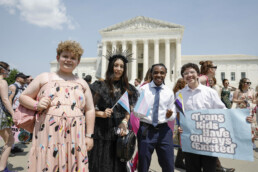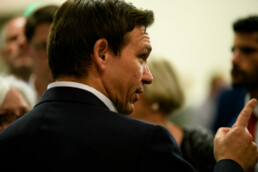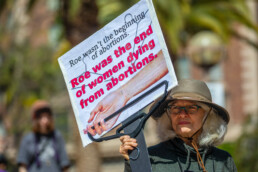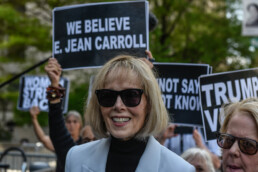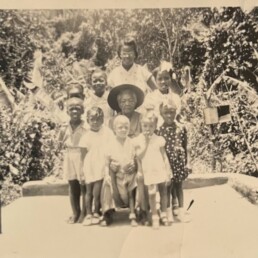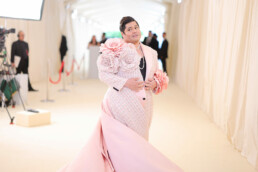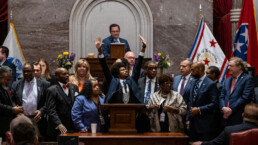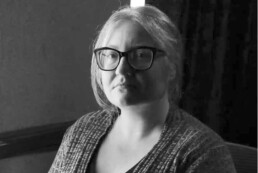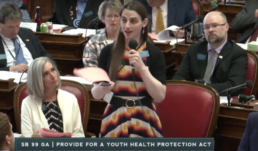Trans Teens Throw Epic Prom
  May 23, 2023 What’s up, Meteor readers? A hearty hello and good evening to everyone except my friend Brittany who got floor seats to Taylor Swift’s Eras Tour and did not spend the entire concert FaceTiming me. We are through. For today’s newsletter, the category is joy. Not just any joy: the unadulterated, vibrant joy of trans teens, adults, and allies dancing at a trans prom on the National Mall. The Meteor’s Mik Bean spoke to Daniel Trujillo, one of the youth organizers, about what the huge party was like. We’ve got that and some pleasant news out of Minnesota. Best believe I’m still bejeweled, Shannon Melero   WHAT'S GOING ONThe Little Senate That Could: Who’s ready for some good legislative news for a change? Democratic lawmakers in Minnesota gave us a perfect example yesterday of how to use a majority—no matter how slight. With only a one-seat edge in the Senate, they passed a whopping 884-page packet of sweeping reforms covering everything from abortion to suicide prevention. So strap in, Minnesotans and Minnesotan-adjacents, and let’s find out what Gemini season has gifted you this year:
Seriously, there’s so much in this thing that I’m not even scratching the surface. I’m barely even tickling it. And all this is on top of the other measures this slight majority had already passed this session: They effectively codified Roe v. Wade for the state. They passed a state-run paid family and medical leave program. They created new protections for Uber and Lyft drivers, leading to this too-cute scene celebrating the bill’s chief author. Oh, and weed will be completely legal by August 1; anyone previously convicted of misdemeanor possession will have their record automatically expunged. All that’s left for last night’s “billosaurus” is for Gov. Tim Walz to sign, and he’s spoken very highly of the move. It’s just wild how much of a difference lawmakers can make when they actually fight for the causes they care about. So congrats, Minnesota. Let’s hope the rest of the country can catch up. AND:
 CORSAGES AND CUMBERBUNDS“You Don’t Like Me? I’m Gonna Throw a Party in Front of Your Office Window.”Teens gather on the National Mall for Trans Youth PromBY MIK BEAN DON'T YOU WISH YOUR PROM WAS THIS MEANINGFUL? (PHOTO BY KISHA BARI) Yesterday, trans children and teenagers from across the country threw a prom on the National Mall, a youth-led public celebration of trans joy at a time when more and more states are adopting viciously anti-trans legislation. The Meteor’s Mik Bean spoke to Daniel Trujillo, 15, one of the event’s organizers, about the power a little party can have. Mik Bean: Of all the events you could think of to celebrate trans joy, what made you and your friends choose a prom? Daniel Trujillo: It stemmed from a lot of frustration me and other trans youth were feeling from continuously [having our existence debated]—and so publicly, too. Me and Libby [Gonzales] were on a call one day, and we were real angry. I was driving back from our state capitol from having to testify [on anti-trans legislation], and we were like, “What do we want to do about this problem?” And we were saying that we need, like, a joyous event. That's how it snowballed. There’s a lot of anti-trans legislation targeting trans youth in school specifically. We chose prom to be a statement of what schools could be like if trans youth were protected instead of being politicized in this really brutal way. Mik Bean is a writer and editor living online. They cover local politics, legal drama, and anything queer.  ONE MORE THINGDo you have particularly strong feelings about this newsletter? We'd love to know what they are! Tell us absolutely everything by filling out our reader survey. You could win a Meteor tote!  FOLLOW THE METEOR Thank you for reading The Meteor! Got this from a friend?
|
![]()
Florida's New Child Kidnapping Law
|
 May 18, 2023 Heeyyoooo Meteor readers, Friends! I’ve come back to you from the wilderness of maternity leave on this lovely Thursday to reclaim my ergonomic newsletter writing throne. Now I know what you’re thinking: What could possibly drag me away from my very cute child perched upon her Boppy? I think we all know the answer to that.  That’s right, I am here with a piping hot 2,000-word essay on Scandoval and its implications, not just on the reality TV landscape (which is now forever changed) but on the sixth wave of feminism, launched by Ariana Madix and Katie Maloney. Just kidding! I save those thoughts for the unhinged voice notes I send my friends late at night. In today’s newsletter, we’re talking about the WNBA, Gen Z’s contributions to feminist theory, and sports bras. But first, let’s get through This Week in GOP Tomfoolery. Shannon Melero P.S. It would be such a great welcome-back-to-work gift if you filled out this survey, all about how this newsletter can better serve you. More deets below!  WHAT'S GOING ONLet (straight) Kids Be Kids: Yesterday
During the signing ceremony, DeSantis celebrated his attempts to keep Florida “a refuge of sanity and a citadel of normalcy” (gross) behind a podium with a sign reading “Let Kids Be Kids.” But studies have found that providing trans youth with gender-affirming care strongly decreases the risk of suicide and depression. Let trans kids be trans, too—or they might not live to be adults. AND:

DEARICA HAMBY AND HER HAMBABIES. (SCREENSHOT VIA INSTAGRAM)
 TALK TO US, WIN A TOTEHelp us help you enjoy The Meteor even more than (we hope) you already do. Share your thoughts with us by filling out a brief survey and be entered to win a Meteor tote bag! Just click the button below to get started.  FOLLOW THE METEOR Thank you for reading The Meteor! Got this from a friend?
|
![]()
"There's literally nothing they could do"
 May 16, 2023 Hello hello, Meteor readers, Everyone wish a happy birthday to Bobi, the world’s oldest dog. Today he celebrates 217 (dog) years of being a very good boy—or 31 human years, if you don’t feel like doing the math. Today’s newsletter features a story we’ve got to stop becoming familiar with: a Texas woman forced to develop sepsis due to the state’s restrictive abortion ban. Plus, we’ve got Martha Stewart on Sports Illustrated, Planned Parenthood taking a stand, and Naomi Osaka shutting down some bullshit. Let’s get into it, Bailey Wayne Hundl  WHAT'S GOING ON A WOMAN PROTESTS FOR ABORTION ACCESS (PHOTO BY IRFAN KHAN/LOS ANGELES TIMES VIA GETTY IMAGES) “There’s literally nothing they could do”: Once again, Texas’ draconian abortion ban has caused a woman to develop sepsis. Last January, Kristen Anaya, a Texas resident, was elated to hear that her in-vitro fertilization had been a success. But only four months into her pregnancy, her water broke. Anaya rushed to the hospital, but, by the time she’d arrived, had lost nearly all of her amniotic fluid. She began shaking uncontrollably, vomiting, and spiking a fever—all signs of an infection that could lead to sepsis. But the doctors were unable to perform a dilation and curettage to help her; the baby’s heart was still beating. According to Anaya’s medical records, she went on to wait 22 hours before doctors were allowed to induce labor to deliver the unviable fetus. Medical personnel first had to contact the hospital’s termination committee—a team of hospital administrators who must approve any abortion care at the hospital—and build a case for the life-threatening nature of her pregnancy. “I was crying, asking for help,” Anaya told ABC News. “And I remember them literally not saying anything. [The doctors and nurses] would just literally look at me and look at Stephen and they’re just blank. There’s literally nothing they could do.” It’s now been one month since Anaya left the hospital. Since then, she has needed two dilation and curettage procedures to remove the placenta and stop her bleeding. Anaya says she is still experiencing pains and complications, as well as a still-dilated cervix. According to Dr. Aileen Gariepy, an OB/GYN and assistant professor at Weill Cornell Medical College, an early dilation and curettage could have more effectively removed the placenta while in the hospital and prevented further complications. It would be easy to write off these horrific—but increasingly common—scenarios as a Texas thing. That’s where Amanda Zurawski was subjected to similar treatment while losing her pregnancy last summer; she’s now joined four other women in suing the state for the harms caused to them by the state’s abortion bans. But this is now an America thing: A new report from researchers at the University of California San Francisco details dozens more health complications caused by abortion bans across the country—including a patient who was denied an abortion for a life-threatening ectopic pregnancy and another who developed a severe infection after leaving the hospital. “Medicine isn’t black and white,” said Daniel Grossman, the lead author of the report. “It’s not like suddenly you know that a patient is at a very high risk of dying in a certain situation. There’s a lot of gray and that risk will slowly change over time.”  RUDY GIULIANI DURING A REPUBLICAN GET OUT THE VOTE BUS TOUR (PHOTO BY MICHAEL M. SANTIAGO/GETTY IMAGES) AND:
 FOLLOW THE METEOR Thank you for reading The Meteor! Got this from a friend?
|
![]()
Why did CNN basically host a Trump rally?
 May 11, 2023 Happy Bey Day, Meteor readers, Last night was a huge spectacle, and no, I’m not talking about Trump’s CNN town hall—though more on that below. I’m talking about the first night of Beyoncé’s “Renaissance” tour: the sexy bee outfit, the enormous disco horse statue, and, of course, the loving homage to Black ballroom culture.  LIKE, COME ON! LOOK AT HER! (PHOTO BY KEVIN MAZUR/GETTY IMAGES FOR PARKWOOD) In today’s newsletter, Rebecca Carroll sits down with Nicole Chung to discuss her new memoir about adoption and loss. But first, the news. Desperately clamoring for tickets, Bailey Wayne Hundl  WHAT'S GOING ON
 MEGAN THEE STALLION SHOWING UP TO COURT TO TESTIFY IN THE TRIAL OF TORY LANEZ (PHOTO BY JASON ARMOND/LOS ANGELES TIMES VIA GETTY IMAGES)
 CULTURE CHANGERSOn Loving and Losing Your Adoptive ParentsBY REBECCA CARROLLNicole Chung on her new memoir A Living Remedy  PHOTO COURTESY OF NICOLE CHUNG Nicole Chung has established herself as a queen of the literary memoir. Born to Korean immigrants and later adopted by a white couple in rural Oregon, Chung’s first memoir, All You Can Ever Know, chronicled her experience as a transracial adoptee, and the search for her remaining birth family in the United States. Now, her latest, A Living Remedy, published last month, is already garnering rave reviews. It tells the gut-wrenching story of losing her two adoptive parents back to back, in 2018 and 2020. As a transracial adoptee, I am moved and astonished by how Chung continues to expand on the adoption narrative (or the perception of it) in such succinct and generous ways. I sat down with her for The Meteor to talk about all of it. Rebecca Carroll: In your new book, A Living Remedy, you contemplate whether or not you would have become a writer had you not been adopted. What is it about your experience as an adoptee that made you become a writer? Nicole Chung: Maybe you’ll relate to this as an adoptee and a storyteller, but you're always telling that formative story over and over whether you feel like talking about it or not. There were certainly many years when I didn't want to share it or tried to find ways to share less of it. But even with the original story my adoptive parents told me about my adoption, which I later learned wasn't quite the truth, I was always struck by the power that can be found in retelling or reclaiming a story, if you're willing and brave enough to reconsider it. RC: It makes me think that as adoptees, we are constantly trying to write our identities into existence. When did you know that you were going to become not just a writer, but a writer of such personal stories? NC: I grew up not seeing anything like my experience in literature. Even stories written about adoption where it's a plot point, I often find bears little to no resemblance to my experience. And it's hard because I was very worried about, and honestly still am, being pigeonholed as this Korean adoptee writer. At the same time, it felt as though I had to write the first book [All You Can Ever Know] before I could write anything else. I just needed to see something like myself in literature to write more of it. RC: There are moments throughout A Living Remedy where you say, “as an adoptee…”—and every single time I read that, it was thrilling because it felt like you were writing directly to me, while also expanding the adoptee narrative. Were you writing to fellow adoptees specifically? NC: With my first book every time I started to lose my nerve or just think, “This is beyond me. I can't tell this story,” or “Who will care?” I thought about fellow adoptees, and that is what kept me going. A Living Remedy is completely different. It’s not that I didn't think about the wider audience with All You Can Ever Know—unlike some people in publishing, I was always convinced there was an audience for adoptee stories. A Living Remedy scared me, though, because it is just a much broader book. I'm writing about many things people call universal when white writers do it—grief, loss, illness. But because of my identity, I did wonder, will I be allowed to do this? RC: Your main subjects, though, your parents, are white—how did that factor in? NC: The story of my family until me is very much a white working-class story. But to be in the family and not have that same experience was one of the things that I wanted to write about, while not making either my race or my parents' race the focus. An interviewer asked me recently if my parents being white made me feel distant from them or their financial hardship, and I just didn't know how to respond. In every way, I thought of them as my parents, except for the basic biological facts. So, of course, I always felt I was part of their experience.  PHOTO COURTESY OF NICOLE CHUNG RC: There’s a passage in the book when you’re in college, about to get married, and your mother accuses you of being embarrassed by them—she says you just see her and your dad as “poor white trash,” which took you off guard. How did you see them? NC: I thought of them as my parents. I thought of them as the people who loved and raised me. I was just beginning to understand the educational and class differences that might happen. I think this is part of almost everybody's coming-of-age story, where you learn to see your parents as whole people, not just your parents. The changing nature of that parent-child relationship is a big part of the book, partly because of the caregiving role I had to step into when both my parents were ill. RC: In one instance, you describe college as stepping into a foothold that your parents couldn't follow you into—what did you mean by that? NC: I had never been away from my parents, where I grew up in this small town in Oregon for longer than a month at summer camp. I wasn't thinking about the fact that they couldn't go with me, or that if I gained education and class privilege, that I wouldn't be able to bring them with me. I was still thinking, “If I make it, they make it.” Of course, I had my own ambition, things that I wanted and hoped for, but I very much thought of myself as doing this for my family. RC: Where did that ambition come from? Because you could have just stayed in the town. NC: Oh, no, I could not have. After my first book came out, someone who had gone to my same church said, “I read your book. It was interesting. That's just not really what I think our community was like for me.” And I said, “Well, of course it wasn't like that for you. You are a white guy. There's a reason that you and I had very different experiences in that community.” Honestly, not to sound dramatic, I thought it might kill me if I stayed. RC: How do you feel now about the place where you grew up? NC: There are beautiful things about it…but it's not home. I never really belonged there, and I know that. I would rather not give racism this power in my narrative, but it's true that as soon as I started hearing slurs on the playground, I started thinking about leaving. I think also it was my parents, and especially my mother, who prepared me to go. RC: I was so struck by your relationship with your mother, and the resolute way in which you write about her love—what have you brought of her mothering to your own? NC: She was a very devout woman. Her deepest faith was in God. But after that, she had so much faith in me as her child. It's not like our relationship was perfect. It was very complicated. Adoption was one of many things that complicated it. But I never doubted her love or her faith in me. And I think that made me braver than I would've been otherwise. If I can bring anything of her parenting to mine, that's what I think about the most. I want my kids to grow up with that sense of reassurance.  RC: In the book, you use the term “unadopted” to describe what it felt like, in part, to lose both your adoptive parents—can you say more about that? NC: I'm not sure it's the term that I'd use now to describe my current state. But my mother was dying—my last link, the last person who knew me as a child or remembered what it was like for me growing up. It was just sinking in that I was going to be carrying these memories of my parents and my grandparents, all alone in a sense. What does it even mean to have lost two families—to have lost one family through adoption, and then the one that adopted me? What does it mean to be an adoptee when your adopted family is gone? RC: If not unadopted, then what? NC: I am still an adoptee. That will always be part of who I am. My parent’s love for me will always shape who I am. I was then and still am really sad that my time belonging to that family is over, and there's no getting it back. There's no finding it with other people. It's just over. RC: How do you bear it? NC: I think there was a time when I wasn't bearing it. I remember just this deep depression I fell into after my father died, and there were echoes of that when my mother was dying. Just the helplessness and the rage, and it felt unbearable. [But] I knew that by living, I could remember [my parents]. It finally became more important to me to be able to live and remember them than to live, punishing myself for what I couldn't do for them. And I think that's still how I bear it, because when I was able to do that and grieve in that way, they felt close again.  Rebecca Carroll is a writer, cultural critic, and podcast creator/host. Her writing has been published widely, and she is the author of several books, including her recent memoir, Surviving the White Gaze. Rebecca is Editor at Large for The Meteor. FOLLOW THE METEOR Thank you for reading The Meteor! Got this from a friend?
|
![]()
Thank you, E. Jean Carroll
 May 9, 2023 Good evening, Meteor readers, I’m coming to you live from Houston, Texas, where approximately five metric fucktons of water have poured from the heavens today. But of course, that’s not today’s top headline: Trump has lost another court case and, thrillingly, a woman he abused has (finally!) gotten some measure of justice. We’ve got that story in today’s newsletter—as well as everything from feminist Pulitzers to trans romance. Drenched yet overjoyed, Bailey Wayne Hundl  WHAT'S GOING ONWho’s the “complete con job” now?: After less than three hours of deliberation today, a jury unanimously found Donald Trump liable for sexually abusing and then defaming magazine writer E. Jean Carroll. Because this was a civil case, Trump faces no criminal consequences, but Carroll has been awarded about $5 million in damages. Carroll had testified that in the mid-1990s, Trump raped her in a Bergdorf Goodman dressing room. At the time, fear of retaliation kept her from coming forward, but as she testified Thursday, the stories of the #MeToo movement made her realize that “staying silent does not work;” in 2019, while Trump was still president, she came forward with her story. Trump denied the charges, calling Carroll “a complete con job” and her story “a hoax”—claims for which he’s now been found guilty of defamation. The two-week trial has itself been gutting—not just because of the details about the assault itself, but because of Carroll’s unflinching candor about the fallout from the attack (she hasn’t had sex since, she revealed in her deposition) and from coming forward against a president (the social-media backlash was swift). “It’s very hard to get up in the morning and receive those messages, that you are way too ugly to go on living,” she said. The jury also viewed a deposition taken in October in which, among other things, Trump claims Carroll enjoyed being sexually abused. (Content warning.) The trial wasn’t a complete win; the jury did not find Trump liable for rape. But headlines saying he was found “not guilty” are getting it wrong, as Philip Gourevitch of The New Yorker pointed out on Twitter; civil courts don’t issue guilty verdicts at all, and this judgment simply means that “the charge was not proven to the jury’s satisfaction.” Carroll—now 79—has thrown herself fully into this case, and the outcome could have huge ripple effects. First, on the presidential election, in which her assailant is still his party’s front-runner. And next, on society’s expectations of rape victims, who have often been dismissed if they don’t scream, or been judged for what they wear. Carroll’s calm dismissal of those biases (“he raped me, whether I screamed or not”) sends a powerful message to other survivors that they, too, may be believed. And one last note: If Carroll had been assaulted in almost any other state, this trial may never have happened. She was only able to pursue legal action thanks to the 2022 passage of the Adult Survivors Act, which provides a one-year window during which sexual assault survivors can sue regardless of preexisting statutes of limitations. Such laws currently exist only in New York and California—but as this week proves, it’d be a good idea to pass them everywhere.  E. JEAN CARROLL LEAVES THE MANHATTAN FEDERAL COURT FOLLOWING HER TRIAL (PHOTO BY STEPHANIE KEITH/GETTY IMAGES) AND:
 FOLLOW THE METEOR Thank you for reading The Meteor! Got this from a friend?
|
![]()
An OB-GYN meets with a midwife
 May 4, 2023 Ahoy, Meteor readers, Tomorrow is International Midwives’ Day. What’s it like to be a midwife at this particular moment in time in the U.S.? Dr. Heather Irobunda traveled to Texas to find out. In today’s newsletter, she reflects on her own family’s history of midwifery, and meets a woman at the center of it all. But first, the news. Celebrating midwives everywhere, Bailey Wayne Hundl  WHAT'S GOING ONFeeling safe vs. being safe: In a city with ever-diminishing access to affordable housing, a Black man named Jordan Neely entered the subway Monday night, lamenting the intense hunger and thirst people experiencing homelessness face. In response, a white man placed him in a chokehold; Neely was taken to a hospital, where he died from a “compression of neck.” How did we become a society that views “behaving erratically,” the phrase many news outlets have used to describe Neely’s actions, as an act justifying killing? How have simple actions like ringing a doorbell or pulling into a driveway become threats? How was the man who was recorded putting Neely in a chokehold allowed to leave freely after some brief questioning? (The incident has since been ruled a homicide, two days afterward, but no criminal charges have been filed.) As this tweet from Sara Hinkley points out, “people don't deserve to FEEL safe, they deserve to be safe. You don't get to dispense death to someone...because you were stopped from FEELING safe.” The New York Coalition for the Homeless released a statement Wednesday saying the fact that the alleged assailant faced no consequences “evidences the City’s callous indifference to the lives of those who are homeless and psychiatrically unwell.” You can donate to the Coalition’s efforts to provide food, housing, and crisis services to people experiencing homelessness here. AND:
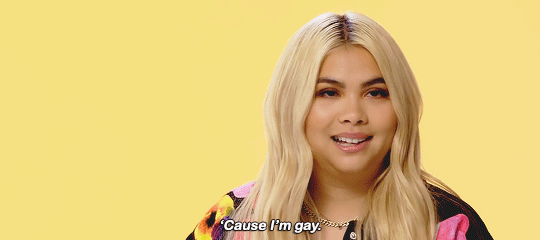
 MODERN MEDICINE“Midwives are for all of us”BY DR. HEATHER IROBUNDAFor International Midwives’ Day, an OB-GYN reflects on her grandmother’s work—and meets a San Antonio midwife providing the same care now  THE AUTHOR'S GREAT-GRANDMOTHER, A “GRAND MIDWIFE,” SURROUNDED BY FAMILY (PHOTO COURTESY OF DR. HEATHER IROBUNDA) In Jamaica, many years ago, my great-grandmother Helen Case was a midwife—what some people would call a Grand midwife or a community midwife. I didn’t know anything about her work until the last couple of years, though: Her history was erased, even within my family, despite the fact that she had delivered all of her grandchildren, many great-grandchildren, and a lot of folks in the community. There was just so much stigma attached to both Black midwives and to the people who used them; the idea was that only poor folks had their babies in homes with “unskilled” midwives and that, if you could afford it, you should go to a hospital. As an OB-GYN, I think about that history and wonder what she would think of the fact that I am a physician who does the same type of work that she did so many years ago. Obviously, in her day, there weren’t many opportunities for a woman, let alone a Black woman, to go to medical school, and delivering babies in Black communities was work for women who looked like us. I think she would find it interesting that that work has become very regulated and formalized, because the Grand midwives learned from the traditions passed down by those before them, not formal schooling. And I think she would find it strange that despite that formal training, outcomes for Black birthing people are so poor. But her history should allow us to recognize that we all—doctors, certified nurse midwives, and doulas—have roles to play in providing good reproductive healthcare, even if those roles are different. (Doulas, for example, can provide important support to patients but cannot deliver babies.) It may sound odd coming from an OB-GYN, but I personally think midwives should be the entry point into obstetric health care for a lot of patients. That’s how it is in many other countries (especially in Europe) if you don’t have other medical issues; it's only if a pregnancy gets more complicated that you see an obstetrician. Here’s why: The medical model of providing obstetric care is very much problem- and solution-based. But pregnancy is not a problem, it's a condition. It's just what a body does. And in midwifery, I’ve found that care can be more focused on the idea of pregnancy as one of the body’s natural conditions. So, during births, midwives are usually lower intervention, and can use certain techniques that may make it a bit more comfortable for patients having vaginal births. And, just as midwives are able to understand how to care for normal pregnancies and birth, Black midwives in particular have insight to our communities and some of the social factors that impact our pregnancies and birth experiences. That’s one reason why, as midwife Nikki McIver-Brown pointed out when I visited her in her San Antonio birthing center last fall, it’s so urgent that we make space for more Black midwives. (The other is that the maternal mortality rate for Black patients is more than twice as high as for white women, according to the Centers for Disease Control and Prevention.) Midwives can help—but only seven percent (up from 2% a few years ago) of them, according to the American College of Nurse-Midwives, are Black. WATCH: DR. HEATHER IROBUNDA MEETS NIKKI MCIVER-BROWN AT HER BIRTHING CENTER. There is, however, a stereotype that using a midwife is something white people and people with money do. But we need to know that midwifery is not only accessible to people with money. Midwives are often covered by insurance, including by Medicaid. I also want people to know that, even when a pregnancy becomes medically complicated—which is the case with some of my patients—doctors can work in tandem with midwives. (I’m personally lucky enough to work in a hospital with a strong midwifery department, and most of our patients birth their babies with a midwife’s assistance.) And, as with my great-grandmother, there is a rich history of Black midwifery in the States which is only just now being excavated. Seeing more Black certified nurse midwives today would be an important bridge to celebrating the contributions of the Grand midwives. Tomorrow is International Midwives’ Day. On it, I’m thinking of my grandmother, and of the many midwives—like Nikki, whose video I hope you’ll watch—who have followed in her footsteps. Midwifery belongs to all of us. We just have to learn about it, like I did. Dr. Heather Irobunda is an OB-GYN in Queens, New York, and one of the founders of Obstetricians for Reproductive Justice. FOLLOW THE METEOR Thank you for reading The Meteor! Got this from a friend?
|
![]()
"Not ugly enough to be a feminist"
 May 2, 2023 Let’s dish, Meteor readers, Happy Asian American Pacific Islander Heritage Month! And welcome to the day after the first Monday in May. We’re dying to know: Who wore your favorite Met Gala look? Was it Harvey Guillén with his enormous flowers? Keke Palmer’s classic Hollywood glam? Janelle Monáe with yet another 10/10 moment? And I’m surprised this didn’t get more coverage, but last-minute guest Tucker Carlson kind of served. Today’s newsletter asks the question that should’ve been asked months before the event started: Why Karl Lagerfeld, in 2023? Plus, it’s time for a writer’s strike! Get your reruns ready. Fashionably yours, Bailey Wayne Hundl  WHAT'S GOING ON50 Shades of shade (and pink): Cats. Pearls. Bikes. My husband, Bad Bunny-Hundl, in a backless suit.  Last night’s Met Gala theme was inspired by Karl Lagerfeld, the infamous creative director for Chanel from 1983 until his death in 2019, along with Fendi and his own label, among others. Lagerfeld was, without a doubt, one of the most influential fashion designers of our time. He defined the style of the iconic brand and kept it relevant for decades. But the deeply offensive comments he made throughout his career are well-documented: from proudly proclaiming that “nobody wants to see round women on the runway” to claiming being fat is “much more dangerous” than anorexia; from his unabashed use of blackface in 2013 to his vocal opposition to Muslim refugees; and from saying Coco Chanel “wasn’t ugly enough to be a feminist” to telling models to “join a nunnery” if they didn’t want to be sexually assaulted. As model Sara Ziff—now a labor organizer for those in the industry—pointed out, we have a long way to go when we honor someone who cares “more about models’ aesthetic value than their rights as workers.” So Lagerfeld was an odd choice to honor in 2023. But the one thing that made it better were the people walking the runway who showed off the kind of progress he didn’t embrace in his lifetime: Lizzo showed up and ATE (literally). Indigenous model Quannah Chasinghorse wore pink, Lagerfeld’s least favorite color. In fact, other than the dominating black-and-white motif, pink was one of the most heavily featured colors of the night. Would he have loved it? Hated it? Don’t care. It made watching worthwhile. So Rest In Pink, Karl. If only fashion’s racism and fatphobia could have died with you.  MY OTHER HUSBAND, HARVEY GUILLÉN, AT THE MET GALA ON MAY 1, 2023. (PHOTO BY MATT WINKELMEYER/MG23/GETTY IMAGES FOR THE MET MUSEUM/VOGUE) “It’s fucking easy”: The Writers Guild of America, which represents over 11,000 active television and film writers, voted unanimously to go on strike last night after six weeks of failed negotiations with various media companies. The WGA seeks pay increases for its members, an incredibly fair ask given the steadily falling pay rates of the industry. (Median writer-producer pay has not gone up over the last decade; in fact, it’s declined 23% when adjusted for inflation.) As Amanda Seyfried put it on the red carpet last night, “I don’t get it…Everyone should be compensated for their work. It’s fucking easy.” If the Discovery CEO David Zaslav can get paid over $246 million in 2021, studios can pay writers a fair wage. So let’s not pretend that the money’s just not there; not paying writers fairly is a choice. AND:
 LIKE, COME ON. LOOK AT THEM! (PHOTO BY TAYLOR HILL/GETTY IMAGES)  FOLLOW THE METEOR Thank you for reading The Meteor! Got this from a friend?
|
![]()
The growing viral resistance to state extremism
 April 27, 2023 Dearest Meteor readers, It’s still Lesbian Awareness Week! How have you been celebrating? 🧐 No matter how you celebrated, I think the White House outdid you; press secretary Karine Jean-Pierre (the first openly LGBTQ person to serve in the position) invited the cast of “The L Word” over. During the press conference, Jean-Pierre said, “As a young queer woman of color, I felt alone and sometimes invisible. For so many people in our community, ‘The L Word’s’ impact cannot be understated.” PREACH! 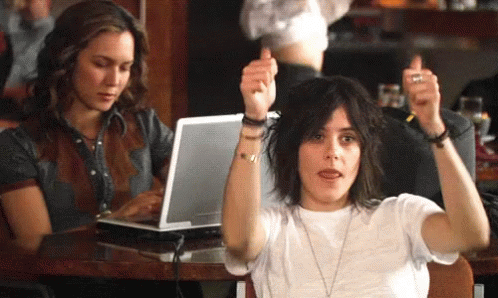 Hopefully you’ve noticed the latest surge in politicians sticking their necks out for causes in which they believe—like Montana state Rep. Zooey Zephyr, who continues to be punished for sticking up for trans rights. (More on that later.) Megan Carpentier sat down with A’shanti Gholar, the president of Emerge, to discuss this recent spark of authentic passion in state legislatures and how we can keep it going. Keeping the fire burning, Bailey Wayne Hundl  WHAT'S GOING ON11,000 people without a voice: First there was Tennessee, where two Black state legislators were expelled for leading gun-reform protests. Now there’s Montana, where the Republican-led House has voted to completely ban state Rep. Zooey Zephyr, the state’s first openly trans elected official, from participating in debates for the rest of this year’s legislative session (which ends on May 6). This move follows days of House Speaker Matt Regier blocking Zephyr’s requests to speak after she (accurately) told Republicans who were trying to interrupt her floor speech about a trans healthcare ban that they had “blood on their hands.” Zephyr will still be allowed to cast her vote—but can only do so remotely, leaving the 11,000 constituents she represents without a voice in House debates. Not to be deterred, Zephyr has set up shop on the hallway bench right outside the chamber. According to Zephyr, her colleagues tried to have her removed. But since she’s only been banned from the chamber itself, she refused. As a trans person, it breaks my heart that, after finally building up enough public support to elect one of our own, we have to watch her be removed for defending our community. Montana House majority leader Sue Vinton chastised Zephyr Wednesday for not following “the rules of decorum.” But as Zephyr said in response, “If you use decorum to silence people who hold you accountable, all you are doing is using decorum as a tool of oppression.” AND:
 LET'S GET LOUD“This is how you save democracy”A'shanti Gholar on the new viral state legislators BY MEGAN CARPENTIER DEMOCRATIC STATE REP. JUSTIN PEARSON OF MEMPHIS ACKNOWLEDGES SUPPORTERS AFTER BEING EXPELLED FROM THE STATE LEGISLATURE ON APRIL 6, 2023 IN NASHVILLE, TENNESSEE. (PHOTO BY SETH HERALD/GETTY IMAGES) Montana state Rep. Zooey Zephyr. Michigan state Sen. Mallory McMorrow. The Tennessee Three (Reps. Justin Pearson, Justin Jones, and Gloria Johnson). Nebraska state Sens. Machaela Cavanaugh and Megan Hunt. You may have seen these state legislators on social media and TV, vocally pushing back against extremist policies on the floors of their states’ legislative chambers—and often getting punished as a result. Why are state legislators’ actions becoming so prominent? In part because of a new wave of politicians—and the people who’ve supported them. As president of Emerge, A’shanti Gholar is one of those supporters; she’s been helping get liberal women elected at the state, local, and federal level for years. She spoke to The Meteor this week about what we’re seeing—and why it matters at a time in which Americans’ trust in government is at historic lows. Megan Carpentier: Why do you think so many of these moments in state legislatures are going viral? A’shanti Gholar: Our democracy is under attack, and people want to know that there are politicians who are fighting for them, who are pushing back, who aren't just going to say, Well, this is just the way the country's going to go and everyone has to deal, knowing that it's “the way the country’s going to go” will disproportionately impact Black and Brown people, young Americans, LGBTQ Americans. When we break it down, there are 520,000 elected offices and the majority of those races—our elected officials—are at the state and local level. And you have voters across this country who feel that their elected officials have failed them, so they're voting them out and/or watching closely what their elected officials are doing. And that's why we're seeing a lot of these viral moments. I love that we see so many Emerge alums [like Mallory McMorrow] who are leading these viral efforts by speaking up, getting on that chamber floor and just speaking truth to power knowing the looks that you're going to get, the possible retaliation, the hit pieces from potential opponents. This is how you save democracy.  A'SHANTI GHOLAR (PHOTO COURTESY OF EMERGE) Do you feel like the kind of people who are getting elected now, especially the younger people, are more willing to take risks than their predecessors? When they're giving these viral speeches, I don't think they're doing it to play it safe! They just know it's what they have to do and, if they end up losing their seats, they know that they went down fighting—protecting their constituents, representing them. And these young elected officials, especially Gen Zers, I like to say they're just built different. For them, this is 100% about service. It's not about power, it's not about ego, it's not about a title. All of these viral videos are them being on the floor doing what they were elected to do and serving their communities. What do you think people should understand as they're watching these young people taking to the chamber floor and really speaking their own truths? There's also older women doing it! It's not just the young people that they should be looking at; there's also their legislative peers who are joining in and are fighting back as well. We can look to someone like Colonel Pam Stevenson in Kentucky, who had a viral speech against the anti-trans legislation there. We should be looking at Tennessee Rep. Gloria Johnson: She is the perfect example of an accomplice. We talk about allies, but what Black and Brown people want are accomplices—people who are going to stand in the trenches and also risk getting expelled. She is the perfect example of an accomplice, which is what I would love for my white sisters to aim to be when they look at her. If we're in a meeting and someone says something wholly inappropriate about Black people, an ally after the meeting comes up and says, “A'shanti, that was just so awful what they said. Sorry you had to hear that.” An accomplice says in the middle of the meeting, “No. What you just said, John, Brad, Chad, whoever, was completely inappropriate and you need to apologize and you need to rethink that.” That's the difference between an ally and an accomplice. What is one thing you want people to understand about these viral moments? What ties it all together is authenticity; that is what we are seeing from everyone who has had a viral moment. It is just who they are. I really want it to be a message to the young women who are thinking about running for office that they can run for office as their authentic selves and win.  Megan Carpentier is currently a freelance editor. She’s also worked at Oxygen, NBC News, The Guardian, and Jezebel, among other places. Her work has been published in Dame, Rolling Stone, Glamour, The New Republic, and many more. FOLLOW THE METEOR Thank you for reading The Meteor! Got this from a friend?
|
![]()
What people really need in abortion-ban states
 April 25, 2023 Pleasure to see you, Meteor readers, Wow, what a week—and it’s only Tuesday. Tucker Carlson, Don Lemon, and NBC Universal CEO Jeff Shell all got fired. Joe Biden announced he’s running again. All in the middle of Lesbian Awareness Week, too. Pick another week to dominate the headlines, dudes! This one belongs to Hayley Kiyoko and Kate McKinnon.  As I’m sure you know, the Supreme Court last week ruled to protect access to the abortion medication mifepristone. We spoke to Robin Marty, director of operations for the West Alabama Women’s Center, for perspective on what this looks like from the South. But first, the news. Saluting all lesbians, Bailey Wayne Hundl  WHAT'S GOING ONGood riddance: FOX News has officially fired Tucker Carlson, reportedly over accusations of sexual harassment from a former employee and possibly over his prolific use of the word “cunt.” And as fun as it is to cheer for his exile from cable news (very fun! I know ‘cause I did it all day!), it’s also worth remembering the many things he wasn’t fired for: He defended Kim Jong-Un. He called wind power a scam. He claimed white supremacy was a hoax. He said Rep. Ilhan Omar (D-MN) was a sign that we should fight against immigration. He warned his viewers that BLM protestors were coming to get them. He blamed “wokeness” for the spread of COVID-19 at the height of the pandemic. He spread lies about the 2020 election, leading to a $787.5 million settlement from FOX. And the list goes on; basically every horrible thing you’ve heard your racist great-uncle ranting about at Thanksgiving originated at Carlson’s desk. And the worst part of it all: People listened. Let! Her! Speak!: Ever since Montana state. Rep. Zooey Zephyr told her Republican colleagues they had “blood on their hands” for attempting to ban gender-affirming care for trans youth, the House chair has blocked every request she’s made to speak on the floor. In protest, Zephyr’s constituents showed up to the House Monday and brought the session to a halt, calling for the chair to recognize her until they were escorted out. Police arrested seven protestors (who were released shortly after) for criminal trespass. But Zephyr will not back down. In a rousing speech given to the press on Monday, she said, “When someone stands up and calls out their bills for the harm they cause, for the deaths they cause, they want silence. And we will not be complicit in our eradication.” AND:
 THE VIEW FROM ALABAMA"Your worst case scenario is something we would kill for"Reproduction rights advocate Robin Marty on what's really happening in states with abortion bans BY MEGAN CARPENTIER  PHOTO BY CHARITY RACHELLE In the wake of Friday’s Supreme Court decision to block a Texas’ judge ruling that would have overturned the Food and Drug Administration’s 2000 approval of the abortion drug mifepristone, many reproductive justice activists rejoiced. But Robin Marty, the director of operations for the West Alabama Women's Center and the author of Handbook for a Post-Roe America, tells The Meteor, “I did not give a crap either way.” That’s because where she lives, access to medical abortions is already illegal. Marty spoke to The Meteor after the decision about what the case meant to patients in states like hers—and what we all can do to help. Megan Carpentier: As someone working in reproductive healthcare in a state that recently made abortion illegal, why did you find the Friday’s decision anticlimactic? Robin Marty: I did not give a crap either way because it feels like this entire lawsuit exists solely for two reasons: It exists so that the anti-abortion movement feels like they're doing something. They needed another fight to keep pressure on politicians, to keep activists engaged, and to keep raising money. But it also exists because it could divide our movement. Until the point at which this decision happened, blue states were at least trying to provide some sort of assistance to states like mine. After the decision, they all got distracted and began thinking: How do we maintain our own status quo? and began spending all their money buying as much medicine as they can. They are so busy trying to make sure that abortion remains exactly as it is in blue states, and the red states are left to flounder. What do you think the end game is for anti-abortion activists? We know that the goal is to end up with a complete federal abortion ban. They believe that, somehow, they are going to be able to create a Christian theocracy. I don't see how that's ever truly going to exist—but also, I did not imagine democracy falling apart as quickly as it has over the last four years. And, being in Alabama, I can see what it will look like if we end up in a place where we no longer have a functioning federal government that ties all these states together. Honestly, Alabama opted out of the federal government years ago. They opted out of expanding Medicaid under Obamacare. They opted out of using federal COVID funding on actual healthcare; instead, they chose to build a prison for a billion dollars. And after abortion was made illegal and the federal government tried to say, “The veterans’ hospitals are federally-funded sites, so we can have this tiny little bit of abortion available there, for people who are on veterans insurance and either have had pregnancies as a result of sexual assault or are having health complications.” Our attorney general literally said, “No, you can't do that. If a doctor does that, I'm going to arrest him and throw him in jail for 99 years.” And then the federal government just kind of said, "Oh, I guess you're right." [Ed note: They did offer to defend healthcare workers who get arrested.] Alabama is not playing by the rules of the rest of the country and what worries me is that Alabama is the bellwether of what red states are going to try and get away with. What should women or organizations be doing to help in states like Alabama? I would love to see something really big and bold. I would love to see people actually pressing back against these laws. I have this fantasy and, in my fantasy, I contact 50 really well-known superstars—actors, musicians, etc.—and they all come down to Alabama with one pack of medication abortion. And patients come (because patients aren't supposed to be able to be arrested over this) and each one of these superstars—Gweneth Paltrow, everybody—says, "OK, here's your medication." They hand it out to the patients and they risk the 99 years in jail, because we can't do it. People like me, people like Dr. Leah Torres, we can't take that risk right now…but they can. They have the resources, they have the endless amounts of money to spend on lawyers. Imagine if they just came down here and did that as an active act of defiance. What is one thing blue state readers should take away? There is a possibility that mifepristone could disappear but, if that does happen, it's not that big of a deal. The sky is not falling. There are other medications that can be used. Yeah, it's not as pleasant, but they will still have access to all misoprostol, to methotrexate, to all the other things that you can use. You'll be able to still get your procedural abortions. Your worst case scenario is something that we would kill to be able to have access to here.  Megan Carpentier is currently a freelance editor. She’s also worked at Oxygen, NBC News, The Guardian, and Jezebel, among other places. Her work has been published in Dame, Rolling Stone, Glamour, The New Republic, and many more. FOLLOW THE METEOR Thank you for reading The Meteor! Got this from a friend?
|
![]()
"I could've changed their hearts"
 April 20, 2023 How’s it hanging, Meteor readers? Weed like to wish a happy 4/20 to all who celebrate. As you may know, I live in Texas where weed is not legal, so I will not be participating. Hear that, local law enforcement? None for me, thanks. Never even touched the stuff.  Of course, as Rev. Dr. Jacqui Lewis points out, a true 4/20 celebration would be liberating the over 40,000 people currently imprisoned for marijuana possession, especially when Black people are 3.64 times more likely than white people to be arrested for it. (Meanwhile, 81% of cannabis business owners in states where it is legal are white.) In today’s newsletter, we take a look at the passionate defense one state rep made for trans people—and the punishment she’s facing as a result. Definitely not blazing it, Bailey Wayne Hundl  WHAT'S GOING ON“Blood on your hands”: In 2022, Montanans elected their first openly trans state representative, Zooey Zephyr. And on Tuesday, House Republicans called for her censure, the harshest form of punishment short of expulsion and a measure typically doled out after acts like tax fraud or making an animated video of yourself killing AOC and Joe Biden. And what had Zephyr done to provoke this punishment? She passionately defended trans people. It all went down Tuesday on the Montana House floor. During a debate over a proposed bill blocking gender-affirming care for trans youth, Zephyr told her Republican colleagues: “If you vote yes on this bill, I hope the next time you bow your heads in prayer, you see the blood on your hands.” The clip went viral, but what most viewers might not know is that Zephyr was speaking literally: Less than a month ago, she later shared, each member of the Montana legislature had received a letter from a local doctor whose partner was treating a suicidal trans teenager in the ER. The child had cited the current legislative session as their top stressor, telling doctors, “My state doesn’t want me.” After Zephyr’s remarks, the Montana legislature’s Freedom Caucus called for her censure, linking her so-called “hateful rhetoric” with the Covenant Christian School shooting in Nashville (which conservatives have tried to paint as an act of “trans terrorism” despite the fact that investigators have been unable to find a motive). The caucus also deliberately misgendered her in its statement. Before she was elected to office, Zephyr had spent years fighting for human rights legislation in her city of Missoula (notoriously one of the bluest areas of Montana). But in 2021, when she saw two anti-LGBTQ bills pass the state legislature by just one vote apiece (SB 215 and SB 280), she decided to run for office. She said in an interview during her campaign, “I know damn well that I could’ve changed their hearts if I had access to these people the way the legislators do.” Even if Zephyr’s actions don’t end up changing the vote, her words have reached far outside the state capitol. Republicans described her language as “inappropriate and uncalled-for,” but to the millions of people who care about trans kids, nothing could be more called for in a moment like this. AND:
 FOLLOW THE METEOR Thank you for reading The Meteor! Got this from a friend?
|
![]()
